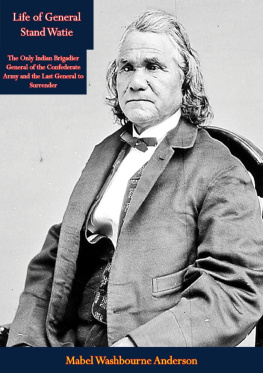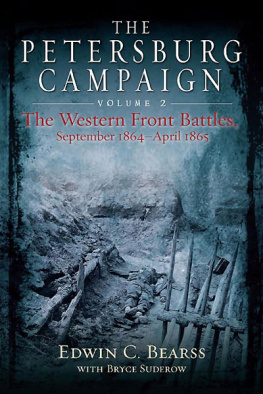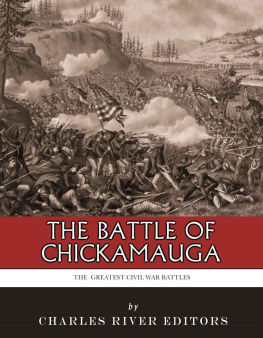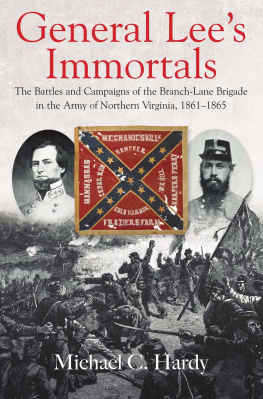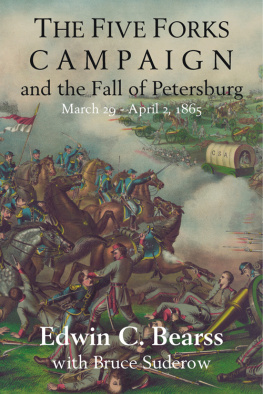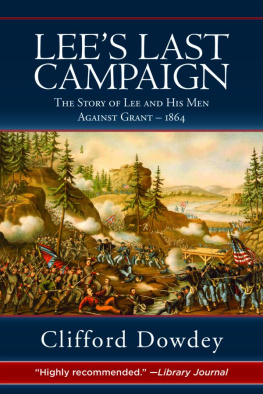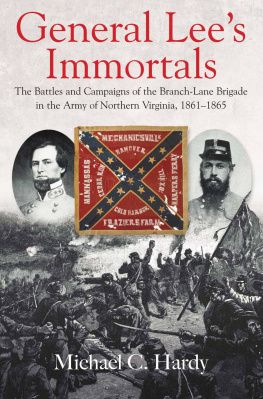
CONFEDERATE WATERLOO
The Battle of Five Forks, April 1, 1865, and the Controversy that Brought Down a General
Michael J. McCarthy
Savas Beatie
California
2017 by Michael J. McCarthy
All rights reserved. No part of this publication may be reproduced, stored in a retrieval system, or transmitted, in any form or by any means, electronic, mechanical, photocopying, recording, or otherwise, without the prior written permission of the publisher.
First Edition, first printing
Library of Congress Cataloging-in-Publication Data
Names: McCarthy, Michael J. (Michael Joseph), 1947- author.
Title: Confederate Waterloo: the Battle of Five Forks, April 1, 1865, and the Controversy that Brought Down a General / by Michael J. McCarthy. Description: First edition. | El Dorado Hills, California: Savas Beatie, 2016. | Includes bibliographical references and index.
Identifiers: LCCN 2016017910| ISBN 9781611213096 (hardcover: alk. paper) |
ISBN 9781611213102 (ebk.)
Subjects: LCSH: Five Forks, Battle of, Va., 1865. | Warren, G. K. (Gouverneur Kemble), 1830-1882--Military leadership.
Classification: LCC E477.67 .M377 2016 | DDC 973.7/38--dc23
LC record available at https://lccn.loc.gov/2016017910
Published by
Savas Beatie LLC
989 Governor Drive, Suite 102
El Dorado Hills, CA 95762
Phone: 916-941-6896
(web) www.savasbeatie.com
(E-mail)
eISBN 9781611213102
Mobi ISBN 9781611213102
Savas Beatie titles are available at special discounts for bulk purchases in the United States by corporations, institutions, and other organizations. For more details, please contact Savas Beatie, P.O. Box 4527, El Dorado Hills, CA 95762, or you may e-mail us at for additional information.
To Karen, my lifes partner and my helpmate without whom this project would never have happened.
List of Maps
Battle of Lewis Farm, March 29, 1865
Dinwiddie Court House, March 31, 1865: 2:00 p.m.
Dinwiddie Court House, March 31, 1865: 5:30 p.m.
Battle of White Oak Road, March 31, 1865
Five Forks, April 1, 1865: 4:00 p.m.
Five Forks, April 1, 1865: 4:15 p.m.
Five Forks, April 1, 1865: 4:30 p.m.
Five Forks, April 1, 1865: 6:00 p.m.
Photos and illustrations have been placed throughout the book for the convenience of the reader
F OREWORD
I first became acquainted with Mike McCarthy four years ago when examining dissertations offered on Dissertation Abstracts, a service to which the Library of Congress subscribes. I spotted a handful of new entries and downloaded them to my e-mail address. McCarthys dissertation, The Battle of Five Forks in Civil War Historiography: The Quest for Honor, stood out from the others. I was immediately struck by the quality of its research and writing.
The dissertation was divided into two sections. The first was comprised of the military aspects leading up to and including the battle of Five Forks. McCarthys use of a wide variety of sources, many of them unusual primary accounts, impressed me. More importantly, I was surprised by his unusual take on the Five Forks battle. Traditionally, authors paint Gens. U. S. Grant and Phil Sheridan as the heroes of Five Forks and sketch Gen. Gouverneur Warren as a plodder, something of a gadfly, and perhaps even a coward. I have long wondered how the man who commanded the bulk of the Union forces at Five Forksknown as the Waterloo of the Confederacy because it was a smashing victory that doomed the Army of Northern Virginiacould have been the mediocre disappointment so often portrayed in Civil War literature. McCarthy had also given this point significant thought and, based upon his deep and extensive research, concluded it simply wasnt so.
The second section of his dissertation, the story of the Warren Court of Inquiry, impressed me for a very different reason. The narrative read like an episode of Perry Masondramatic, artfully presented, and cogent. McCarthys work tied together the significant strands in the 1,400 or so pages of documentation and clarified the entire proceeding like no one else had ever done. I had a hand in editing those extensive records some years back, so I fully appreciated what he had achieved. Few people know that the Warren Court of Inquiry produced the longest record of any military court in the United States during the nineteenth century. When I finished reading the dissertation, I got in touch with Mike at his home in Albany, New York, and told him how much I admired his work. This began what I hope will be a lifelong friendship.
The book you are now holding is not just a reformatting of his original dissertation, edited to make it readable for the general interest public. For example, several new sources have become available since the dissertation was finished, and these have been added to the main text, and the notes have been adjusted and fleshed out. Mike also joined me on trips to the Five Forks battlefield, where we tramped for hours through the woods and fields discussing various issues and sources. This resulted in the reworking of some portions of his study. Nothing helps a writer understand his subject better than a visit to the actual location.
Some historians are beginning to gravitate toward McCarthys conclusions, though he was well ahead of this burgeoning trend. Joseph Roses recent scathing and exceptionally well-researched indictment of General Grant, for example, in Grant Under Fire: An Expos of Generalship & Character in the American Civil War , applies a broad brush to many of the themes exposed in Mikes work. Civil War historians ignore this line of interpretation at their peril.
Above all, Mike is a good writer and an even better historian. Like most of the rest of us, he read Bruce Catton and his contemporaries as a teenager, but he did not buy into many of the poetic myths these writers painted as truth like so many of us did. Mikes take on Grant, Sheridan, and Warren comes instead from the unjaundiced eye of a historian unafraid to let the sources lead the way to the truth of what happened that day so long ago.
The night I first talked to Mike I made us both a promise: I would help him get this extraordinary dissertation published. I thought it best belonged with Savas Beatie. I am proud to say that I contacted my friend Ted Savas and convinced him to take a look.
I firmly believe careful readers of this volume will agree that Confederate Waterloo: The Battle of Five Forks, April 1, 1865, and the Controversy that Brought Down a General is a fascinating story, beautifully told.
Bryce Suderow
I NTRODUCTION
M any years after the fighting at Five Forks and the close of the Civil War, a former Confederate general named Thomas Munford wrote the following:
It was at the battle of Five Forks, on the evening of April 1, 1865, that the sun of the Southern Confederacy went down and the star of its destiny set. No military event since the surrender of Cornwallis at Yorktown has exercised greater influence on the fate of America, or civilization itself, than that disaster which destroyed the power of the South and blasted her hopes of independence. Compared with such battles as Malvern Hill, Sharpsburg, 2nd Manassas, or Gettysburg, it could be classified as a mere skirmish, but no other fight of the entire four years struggle was followed by such important consequences. It was to the United States as Waterloo to Europe. It made the United States a nation. It was the immediate cause of the precipitate removal of President Jefferson Davis and his governmental officials from the Capital at Richmond, and it forced Gen. Robert E. Lee to evacuate his old fortifications before he was ready to do so, and to retreat towards Appomattox. It extinguished the campfires of the hitherto invincible army and was the mortal wound which caused the Southern Confederacy to perish forever.
Next page


